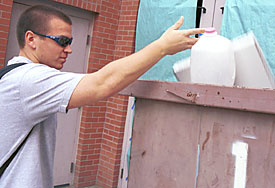 |
|
DEREKH FROUDE/Arizona Daily Wildcat
|
Business freshman Nick Munson tosses his trash Thursday into a trash bin outside Apache-Santa Cruz Residence Hall. Students living in residence halls are seeking to organize alternatives to the recycling program eliminated this summer by Residence Life.
|
|
By Keren G. Raz
Arizona Daily Wildcat
Friday September 6, 2002
With the retirement of Residence Life Recycling, students in the residence halls are pondering how and if they will recycle.
Many halls plan to form committees to coordinate recycling efforts. However, as most hall governments have yet to be elected, an organized recycling effort may take time to develop.
Residence halls such as Gila Residence Hall and Arizona-Sonora Residence Hall do not have recycling plans underway, which is worrisome to students who think that a hall government recycling program without UA sponsorship may not materialize.
"I don't think (student-run recycling) is a good idea for the simple reason that it's not going to be accessible. I'm not going to take the steps to do it on my own," said Pete Seat, theater arts sophomore and resident of Coronado Residence Hall.
However, RAs at Kaibab-Huachuca are jumping ahead of hall government and organizing a recycling effort that they can pass on to the students.
"Some RAs are looking to organize a building-wide recycling effort. They recognize the need, that if it is not going to happen nationwide, than it needs to happen in the building," said William Evans, Kaibab-Huachuca hall director. "We talk about building community and one responsibility of building a community is taking care of the maintenance."
Jereme Bintz, a political science sophomore at Gila agrees that handing the recycling program over to the students is "not completely a bad thing. It is better in the hands of students than for it to completely disappear."
Many organizations are starting to look to ways to manage the task that has now been placed on the residence halls.
"If students really want to recycle, they should go to (Residence Hall Association) meetings and get a program started," said Karen Black, a psychology senior and RHA national communications coordinator.
Also, representatives of campus recycling clubs and organizations are coordinating a meeting about recycling in the halls, said Shawn Nock, a former volunteer student coordinator for Residence Life Recycling.
 |
|
"We talk about building community and one responsibility of building a community is taking care of the maintenance.
-William Evans
Kaibab-Huachuca
Residence Hall director
|
 |
One proposal is that the Arizona Student Recycling Association will raise funds to pay Campus Recycling to do collections for the halls.
Campus Recycling charges $18.75 an hour to collect recyclables.
In addition, Residence Life Recycling will continue to receive its allotted budget of $13,000.
Residence Life Director Jim Van Arsdel was not available for comment.
In the past, $9,600 of the $13,000 was allocated for wages for student coordinators.
Bins cost Residence Life Recycling $2.35 each.
There were usually two student coordinators who were paid $6.25 an hour to do weekly aluminum can and plastic pick-ups, deposit money earned from aluminum cans, write a report detailing the income and expenses, establish recycling chairs in the halls and hold monthly meetings to keep them informed, publish an online newsletter each semester, and educate residents on proper recycling procedures, said Joel Hauff, associate director for administrative services in Residence Life.
Last year, Residence Life Recycling only had one hired student coordinator. Only $5,500 in wages were paid. However, during the 2000-2001 year, $12,900 was paid out in wages, Hauff said.
The remaining $3,400 covered operational recycling costs such as $700 for T-shirts, recycling chairs in the halls, tarps to cover rental trucks, food for recognition meeting and meetings with recycling chairs, office supplies, trash can liners, bins and vehicle-related expenses.
Although Hauff said that the collection process became too large a burden for the student coordinators, Nock disagreed.
"The students who did all the collections did not spend as much time as many people think," said Nock, adding that collecting and delivering recycling in residence halls across campus took about four to five hours each Saturday.

